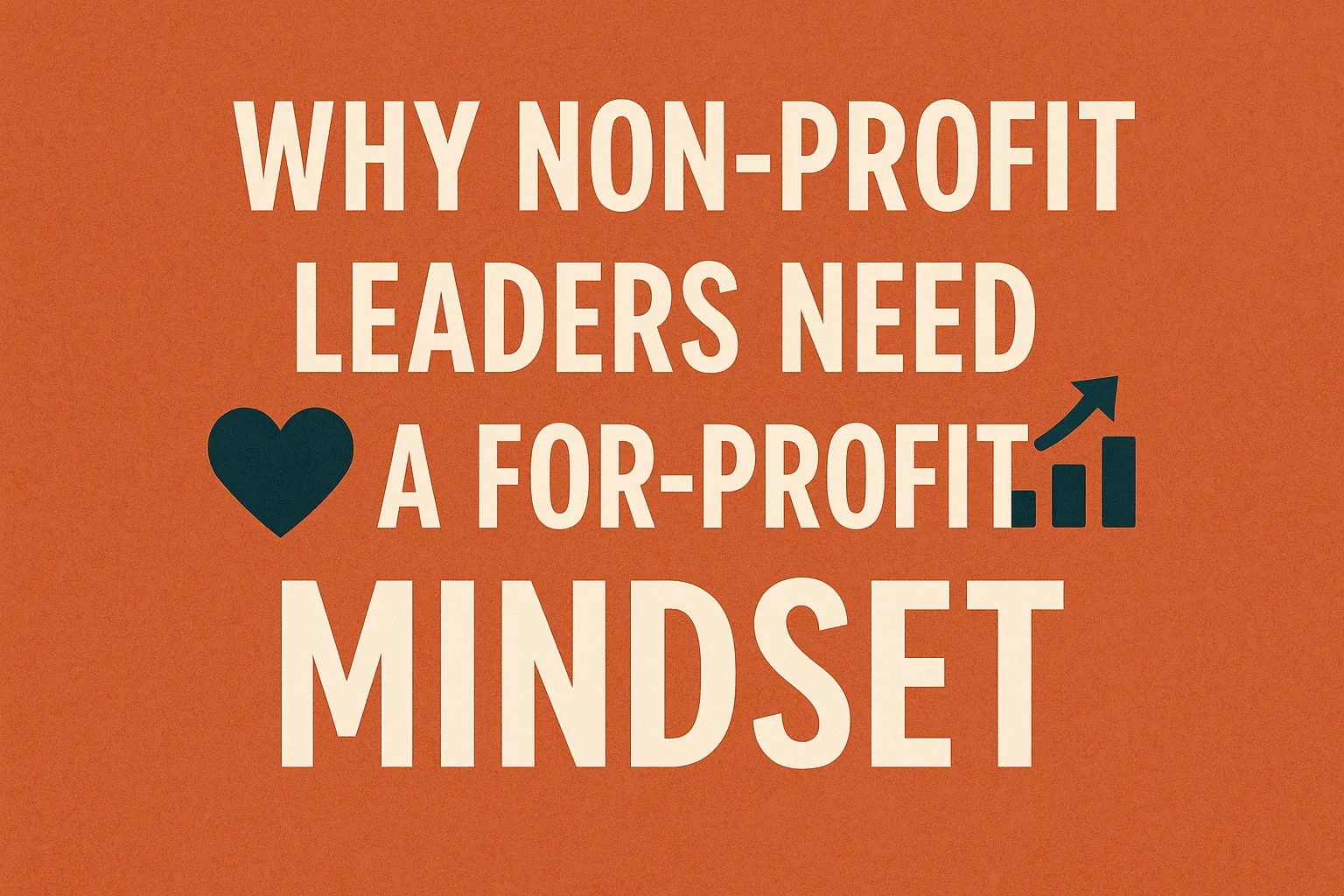Why Non-Profit Leaders Need a For-Profit Mindset
The divide between non-profit and for-profit sectors has traditionally been viewed as irreconcilable; like a yawning chasm of opposing values, morals, approaches, and mindsets.

The divide between non-profit and for-profit sectors has traditionally been viewed as irreconcilable; like a yawning chasm of opposing values, morals, approaches, and mindsets. Many non-profit leaders have been conditioned to believe that business principles are somehow at odds with charitable missions, that revenue generation compromises integrity, or that operational efficiency means sacrificing compassion.
Having worked with organizations across both sectors, I've observed that this false dichotomy often limits the potential impact of mission-driven work—the kind of work that is most deserving of amplification.
The truth is more nuanced: while you can't (and shouldn't) run a non-profit exactly like a business, strategically adopting business principles where appropriate can dramatically enhance your organization's ability to create sustainable, scalable change.
Here's why developing a for-profit mindset as a non-profit leader can be transformative for the communities you serve:
1. Business Acumen = Sustainability
Non-profits with longevity share a common trait: they understand that financial sustainability is not opposed to mission fulfillment, it's essential to it. A for-profit mindset recognizes that every organization, regardless of tax status, must generate more resources than it consumes to survive and thrive.
This doesn't mean abandoning your mission in pursuit of money. Rather, it means applying sound financial principles to ensure your organization can continue serving its beneficiaries for years to come.
Practices like maintaining adequate operating reserves, understanding your real cost per outcome, and developing diverse revenue streams aren't "corporate" concepts—they're fundamental to creating lasting impact.
When non-profits operate from crisis to crisis or grant to grant, they're forced into short-term thinking that ultimately diminishes their effectiveness. By contrast, organizations that embrace financial planning and sustainability can make strategic investments in their programs, staff, and infrastructure that yield exponential returns in their impact.
2. Innovation
For-profit companies understand that innovation isn't optional—it's existential. The business landscape rewards those who continuously improve their products, services, and processes, while punishing complacency. This principle applies equally to mission-driven work, where outdated approaches can severely limit your impact.
Adopting a for-profit mindset means critically examining your programs and operations with the same rigor a business would apply to its products. Are your interventions achieving the outcomes you seek? Could your resources be deployed more effectively? Are there emerging needs or opportunities your current methods don’t adequately address?
This doesn't mean abandoning what works—the business adage of "don't fix what isn't broken" applies here too. The most effective non-profit leaders can distinguish between tradition (doing something because "we've always done it this way") and proven effectiveness (continuing a practice because data shows it achieves results). They preserve and scale what works, while continuously seeking improvements and innovations that could enhance their impact.
3. Operational Efficiency
For-profit businesses understand that operational efficiency directly affects the bottom line. In non-profits, efficiency should be viewed through a different but equally important lens: every dollar saved through improved operations is a dollar that can be directed toward mission impact.
This doesn't mean cutting corners or creating unsustainable workloads. Instead, it means thoughtfully examining processes, leveraging appropriate technology, eliminating redundancies, and ensuring that administrative functions serve rather than hinder programmatic work.
A non-profit that reduces its cost to serve each beneficiary by 20% through operational improvements doesn't just save money—it can potentially increase its reach by 20% with the same resource base. This isn't about doing more with less; it's about maximizing the impact of every resource entrusted to your organization.
4. Strategic Partnerships
Businesses regularly form strategic alliances that leverage complementary strengths and expand market reach. Non-profits can benefit tremendously from this approach, moving beyond the scarcity mindset that sometimes views similar organizations as competitors for limited funding.
A for-profit mindset seeks win-win collaborations that can amplify impact through shared resources, complementary expertise, or expanded geographic reach. This might mean formal partnerships, joint programming, shared services, or even mergers when appropriate. The ultimate goal isn't organizational preservation but maximum mission fulfillment—sometimes best achieved through strategic collaboration.
Balancing Mission and Method
While adopting business principles can greatly enhance a non-profit's effectiveness, it's essential to maintain clarity about the fundamental difference between sectors: businesses ultimately exist to generate profit for owners or shareholders, while non-profits exist for a much more meaningful (and often complex) purpose: caring for others, generating change, and transforming lives.
The most effective non-profit leaders don't mindlessly import business practices; they thoughtfully adapt appropriate principles that serve their missions. They recognize that business methods are tools to be selectively employed in service of impact—not goals in and of themselves.
Finding this balance isn't always easy, but the organizations that succeed in integrating appropriate business approaches while staying deeply connected to their missions achieve something remarkable.
In the end, the question isn't whether non-profits should adopt business principles, but rather which principles will best serve their unique missions. By developing a discerning for-profit mindset, non-profit leaders can access powerful tools for advancing the changes they seek in the world—all while remaining steadfastly committed to the values that inspired their work in the first place.
.svg)





